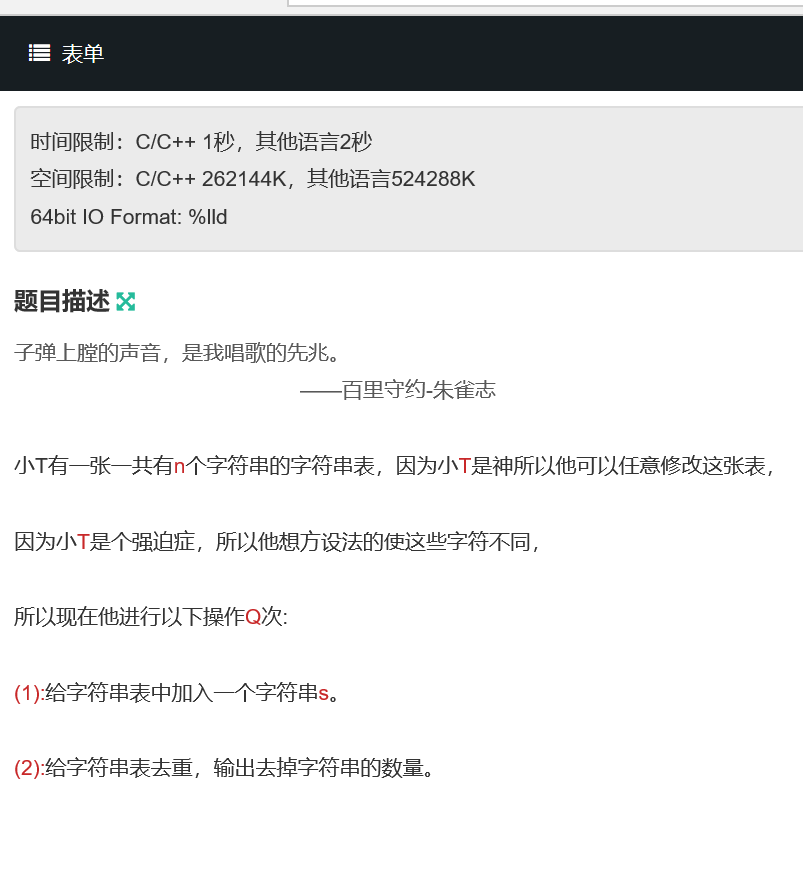It's very late at night, so I'll make a long story short.
1. Forms

Links: https://ac.nowcoder.com/acm/contest/917/C
Source: Niuke.com
Input Description:
The first row contains two integers n,Q
One string per line in the last n rows
The last Q line represents one operation per line:
One operation: 1 s
Second operation: 2
Output description:
For each two operations, answer.
Before this problem, I thought that the input of 44 was useless. As a result, I didn't program it directly. I planned to add it at the end of the program. As a result, I forgot that the problem of withdrawal cycle was time-consuming and labor-intensive, which affected the progress of solving the problem. Next time, first of all, 1. Write the input format first. 2. See the conditions that can be given as clearly as possible, and unite all forces that can be united.
Somehow flag ends with 0 each time causing an error.
Change cin to scanf to improve accuracy
Both of the above are compiler's own sb
It's worth noting that loops for map s can't be placed in loops and will time out.
Below I release the long-awaited map and iterator usage, it is really too convenient, the feeling of gun replacement is not the same!! Kaisen (/> =)/
map<string,int> word_count; map<string,int>::iterator iter; //Input string entry map for(int i=0;i<a1;i++) { cin>>word; ++word_count[word]; } //Yes map Traverse and manipulate the values for(iter = word_count.begin(); iter != word_count.end(); iter++) { res+=(iter->second-1); iter->second=1; }
There is an improvement in the way of thinking in this question:
The core of this topic is to ask, the number of character repetition, I have always felt that the number of times in the map statistics part, the number, began to worry about this, and then directly traverse each minus 1, is the number of repetitions.
But there are better ways. use
if(flag==1) { cin>>word; //if The contents in parentheses are used. map If this word has not appeared before and no one has found it, then it must be. //yes false,This means that there is repetition, and the number of repetitions is counted with a single variable only at this time. //++It can reduce the computational burden. if(word_count[word]) res++; else word_count[word]=1; flag=0; }
Here is my solution:
#include<iostream> #include<math.h> #include<map> #include <string> #include<stdio.h> #include <cstdlib> using namespace std; int main() { map<string,int> word_count; map<string,int>::iterator iter; string word; int flag=-1; int res=0; int a1,a2; //scanf("%d %d",&a1,&a2); cin>>a1>>a2; for(int i=0;i<a1;i++) { cin>>word; ++word_count[word]; } for(iter = word_count.begin(); iter != word_count.end(); iter++) { res+=(iter->second-1); iter->second=1; } for(int i=0;i<a2;i++) { //cout<<"flag:"<<flag<<endl; scanf("%d",&flag); //cout<<"flag1:"<<flag<<endl; //cin>>flag; if(flag==1) { cin>>word; if(word_count[word]) res++; else word_count[word]=1; } else { cout<<res<<endl; res=0; } } return 0; }
Real Big Man's Code, See What's Xinda Ya
//Membrane Big Man #include<bits/stdc++.h> using namespace std; int n,q,res; map<string,int> mp; int main() { scanf("%d %d",&n,&q); while(n--) { string str; cin>>str; if(mp[str]) res++; else mp[str]=1; } while(q--) { int op; scanf("%d",&op); if(op==1) { string str; cin>>str; if(mp[str]) res++; else mp[str]=1; } else { printf("%d\n",res); res=0; } } return 0; }
2. Use POW cautiously
Especially, it's easy to have problems when we finish square work first.
int main() { int n=100; //If it is double Yes, the result could be 100.,If it is int The result is 99. Estimation is due to accuracy, but below //Take care not to use pow,The better solution is to multiply directly. t*t,Anyway, it's only multiplied once, but it's stable and correct. //The rate will be much higher. double t=sqrt(n); cout<<t<<endl; double k=pow(t,2); cout<<k<<endl; return 0; }
3.
Pay special attention to an ideological problem
There are some problems that require the number of iterations. If you have a global variable count, remember to clear 0 before each iteration.
There are at least two questions to find the common factor this time. The direct traversal method is easy to overtime. Here we introduce a rolling phase division method.
Example 1. Find the maximum common factors of two positive numbers 8251 and 6105.
(analysis: rolling phase division residue zero result obtained)
Solution: 8251 = 6105 x 1 + 2146
Obviously, the greatest common factor of 8251 and 6105 is also the factor of 2146, and the common factor of 6105 and 2146 is also the factor of 8251, so the greatest common factor of 8251 and 6105 is also the greatest common factor of 6105 and 2146.
6105=2146×2+1813
2146=1813×1+333
1813=333×5+148
333=148×2+37
148=37×4+0
Then 37 is the greatest common factor of 8251 and 6105.
The above method of finding the greatest common factor is rolling division. Also called Euclid Algorithms, it is by Euclid stay 300 BC Left and right first put forward.
int gcd1(int a,int b) { int temp; if(a==0||b==0) return -1; if(a<b) { temp=a;a=b;b=temp;} //Find the maximum and minimum value. a Representation, small use b Express while(b!=0) //Finding the Maximum Common Number by Circulation { temp=a%b; a=b; b=temp; } if(a==1) return -1; return a; //Gcd }